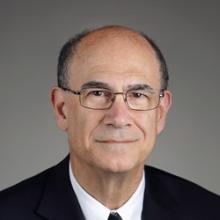
Mark Hallett, M.D.
Mark Hallett, M.D., Distinguished Investigator in the Human Motor Control Section, has mentored at least 150 trainees over the course of a long and successful career in neuroscience research. Many of those mentees have entered productive scientific careers themselves, often returning to collaborate with their former mentor. In honor of Dr. Hallett’s retirement at the end of 2022, we asked him a few questions to capture and share his fine-tuned mentorship philosophy.
What makes an effective mentor-mentee relationship?
An effective mentor-mentee relationship depends on good communication and mutual respect.
The mentee must be able to ask questions and get advice as needed—and to be able to do so in a timely manner. For this, trust is critical. Mentees need to be able to trust their mentors to believe what is said, and this will allow mentees to learn from the mentorship.
The mentor should understand the mentee, appreciate their level of knowledge and intelligence, and teach at the appropriate level. The mentor must be available and ready to spend the necessary time. Additionally, the mentor should respect the mentee’s ideas. This will lead to good conversations that are fun as well as progressive learning by the mentee.
What expectations should a mentor and mentee have of each other in the lab?
I have found that it’s a give and take. Mentors should expect that the mentees show up on schedule, pay attention, and work according to plan after a mutual agreement is established. Mentees should expect that mentors will devote sufficient time, be respectful, and convey useful information.
How can mentors encourage innovative ideas?
Of course, a mentor shouldn’t reject all suggestions and tell mentees just to do what the mentor wants. Innovative ideas can be encouraged by having the mentees come up with their own projects and protocols. I believe that it’s best to let them try out most ideas, even if they might not succeed. It’s also useful to encourage free-ranging discussion.
Is there a mentorship experience that stuck with you?
One type of mentorship experience that, happily, I have experienced many times is mentoring young trainees, mainly those in college or who just graduated. In addition to being available to answer questions and give advice, I enjoy helping them see clinical work and research activities in action, to realize how interesting they are and how much fun they can be. This exposure can lead to trainees discovering the type of work and activities they want to pursue. I then enjoy hearing from them when they are enrolling in or finishing a neurology training program. That is clearly a successful mentorship experience!
What’s your number one piece of advice to neuroscience trainees?
The most important advice is to enjoy what you are doing. That will provide the energy to work hard and accomplish your goals.
Contributed by Shana R. Spindler, Ph.D., freelance science writer and former NIH postdoctoral fellow.
